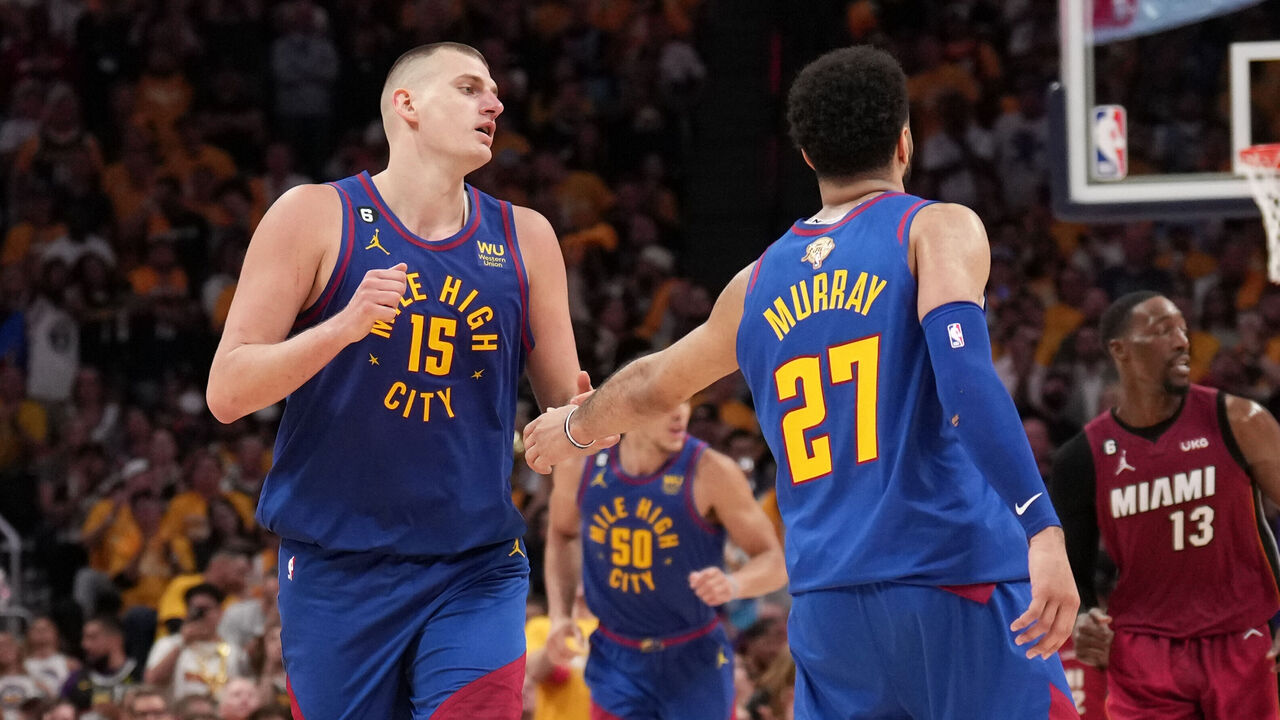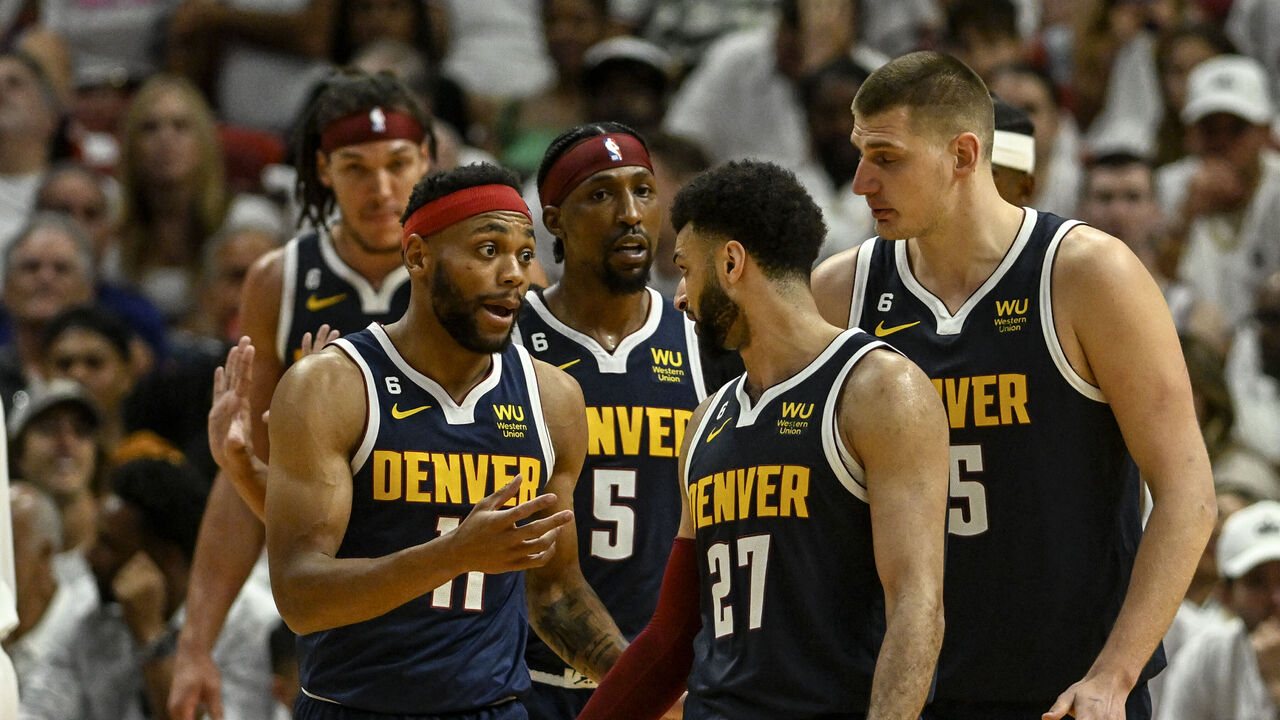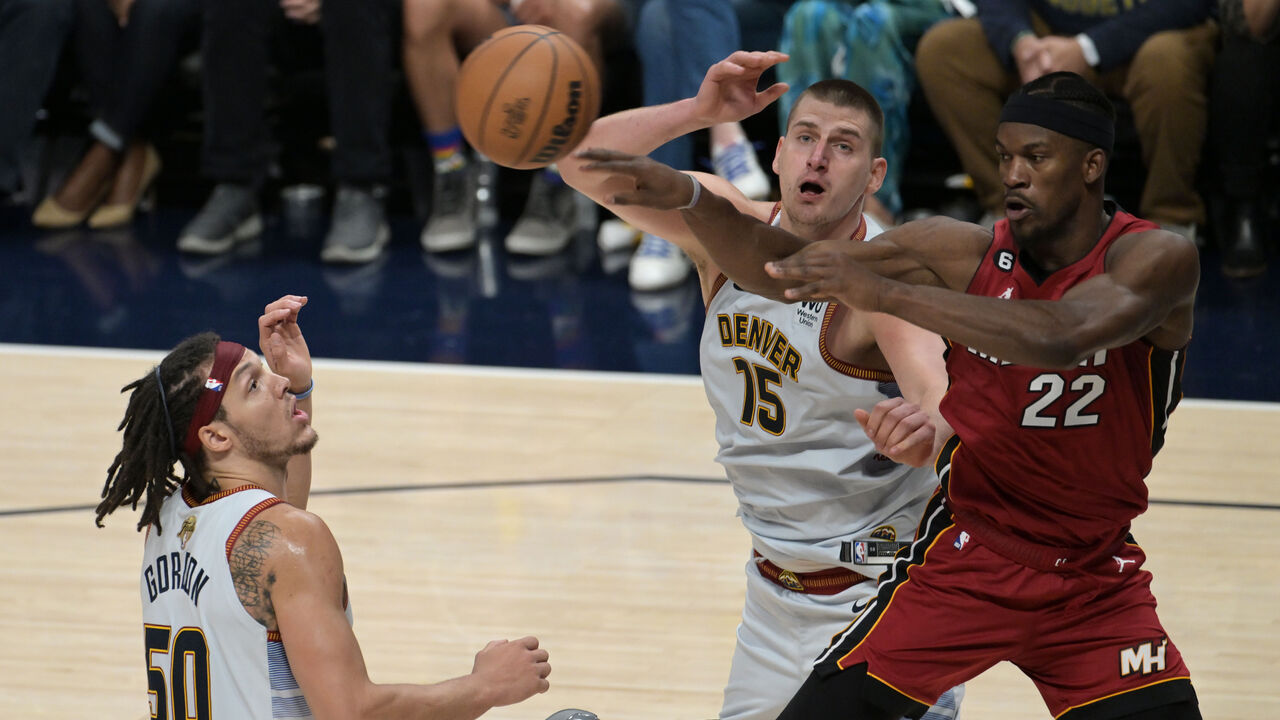It felt fitting that the Denver Nuggets capped off their 2023 title run by winning an absolute rock fight over the Miami Heat in which they shot 5-for-28 from deep and managed just a 97.9 offensive rating – by far their worst mark of the playoffs and also the worst offensive showing for any winning team throughout this postseason.
For years the Nuggets have been defined and carried by their offense, while facing a ton of questions about the viability of their defense. Their grind-it-out Game 5 clincher spoke to all the different ways they found to win this year, and capped off a 16-4 romp that represented the best playoff record for any team since the 2016-17 Warriors. Say whatever you want about the quality of competition, this was one of the most dominant postseason runs of the last two decades.
It all obviously started with Jokic, the unicorn of all unicorns, who put the finishing touches on a postseason for the ages: 30 points, 13.5 rebounds, and 9.5 assists on 63% true shooting against a sampling of some of the league’s best defensive big men in Rudy Gobert, Anthony Davis, and Bam Adebayo. None of them had the faintest notion of an answer for him, and it wasn’t for lack of trying. Dealing with his combination of strength, footwork, balance, anticipation, and touch as a scorer is a tall enough task without throwing his otherworldly passing into the mix. Trying to keep a lid on him as a short-roller is hard enough without having to account for him as a 3-point pick-and-pop threat.
Gobert probably had the most success, and Jokic still averaged 26-12-9 in a five-game first-round rout of the Wolves. Deandre Ayton did a heck of a job battling Jokic when Phoenix swept an undermanned Nuggets squad back in 2021, but this time around Jokic made mincemeat of him and the Suns, putting up 35-13-10 and making a mockery of their attempts to play him in single coverage. The Lakers threw him a changeup by making Rui Hachimura his primary defender while sticking Davis on Aaron Gordon and unleashing him as a back-line rover. Jokic went 28-15-12 in a sweep.
None of those opposing centers could do a ton against Jokic at the other end of the floor, either, be it as screen-rollers or iso scorers. He’s been the league’s best offensive player for a good three years now but this run cemented him as its best player – full stop. Not only because his offense was so much better than everyone else’s that it erased whatever defensive gap existed, but because he proved beyond a doubt that his defense could hold up to playoff scrutiny.
Of course, to go all the way Jokic needed a proper running mate who could help him shoulder the load and confront defenses with impossible choices (we saw what the last two postseasons looked like when he didn’t have one). Jamal Murray didn’t just return to peak form after his long injury layoff, he ascended to new heights and took the Nuggets with him. After averaging a solid 20 points and 6.2 assists on 57% true shooting during the regular season (half of which was spent shaking off 18 months’ worth of rust), he exploded for 26.1 points and 7.1 assists on 59% true shooting in the playoffs.
Murray’s outrageous shotmaking bailed Denver out of numerous jams and cracked open all manner of defensive schemes. He made drop coverage untenable, and forced opposing defenses to concede switches that Jokic obliterated on the back side. When the Lakers loaded up on Jokic’s rolls and post-ups, Murray torched them for 33 points on 53/41/95 shooting. When the Heat showed him extra bodies and tried to tamp down his scoring, he leveraged his playmaking chops and averaged a Finals-leading 10 assists. When his passes weren’t leading directly to buckets, he was getting off the ball early and relocating expertly to keep Miami in the blender.

Still, for as dominant as those two were individually and in tandem, none of this would’ve been possible without the contributions from their supporting cast.
Gordon gets top billing among that crew, shaping himself into the perfect Nuggets role player with his bruising physicality, heady cutting ability, penchant for duck-ins and early post seals, and multi-positional defensive acumen. He looked like the potential missing piece of Denver’s championship puzzle when he was acquired at the 2021 trade deadline, right up until Murray’s ACL tear rerouted the team’s course only nine games into Gordon’s tenure. A little over two years later, with Murray back in the fold, Gordon proved to be exactly that.
His work as a small-ball backup center helped solve Denver’s yearslong inability to stay afloat with Jokic on the bench. His ability to screen, pass, make plays in space, and hit the occasional spot-up three were instrumental in overcoming the inverted defensive alignment the Lakers and others threw at him and Jokic. He played as big a part as Jokic did in leveraging the Nuggets’ size advantage over the Heat, especially in the tone-setting first half of Game 1 and his career-defining performance in Game 4. And he did all that while serving as the primary defender on Karl-Anthony Towns, Kevin Durant, LeBron James, and Jimmy Butler.
Michael Porter Jr. made enormous defensive strides this season, and with the exception of a rough patch in the middle of the Finals, he mostly carried those refinements through the playoffs. His size and improved awareness on the back line were crucial components of the Nuggets’ defensive game plan, especially in the Suns series when Jokic was constantly playing up at the level and Porter was tasked with low-man and strong-side-overload duties.
When his shooting abandoned him against the Heat, he cut hard and crashed the glass to help Denver win Games 4 and 5. He rounded out his game on both ends to the point he could be a positive contributor in the Finals while shooting 4-for-28 from 3-point range, abjectly failing at the one thing he’s supposed to do at an elite level.
The Nuggets front office deserves immense credit for complementing that core quarter with a series of offseason home-run moves. Trading for Kentavious Caldwell-Pope was a stroke of genius that completed the starting five with one of the game’s best movement shooters and point-of-attack defenders. Denver sacrificed some ball-handling in the bargain (a big bet on Murray’s return to form), but were rewarded with a low-maintenance role player who fit the healthy version of the team to a T and understood perfectly how to play off of Jokic and Murray’s gravity.
Bruce Brown proved to be an ideal free-agent signee, and not even for all the same reasons he seemed at the time to be an ideal free-agent signee. He’d served largely as a cutter and undersized roll man in Brooklyn, and while those skills were still useful in Denver, the big revelation was what he was able to do when the Nuggets put the ball in his hands and asked him to initiate offense.
On top of his rock-solid perimeter defense, Brown’s burst off the dribble was a reliable weapon for the team’s transitional lineups. Getting to the hoop becomes more difficult in the playoffs – rim frequency this year declined to 28.6% from 33.3% in the regular season – but Brown’s actually increased despite him creating far more of his shots for himself (going from 44.9% of his 2-pointers being unassisted to 62.5%). Not a bad for a guy who was signed using the taxpayer MLE.
Others chipped in with crucial minutes at crucial moments, from veterans like Jeff Green to newcomers like Christian Braun. Those depth pieces were the reason Denver was outscored by just three total points in the 176 playoff minutes Jokic sat.

Offense remained the team’s calling card; for the playoffs as a whole, the Nuggets scored two more points per 100 possessions (118.2) than any other team, and equaled those same 16-17 Warriors as the most efficient champions in history. Their versatility on that end was unparalleled. They were as deadly running spread pick-and-roll as they were running elbow offense, low-post offense, dribble-handoff action, and split action, with so much of it flowing out of their innumerable Horns variations.
There was no sensible coverage for the Murray-Jokic two-man game, no knuckleball that fazed them, nothing that worked for more than a few possessions at a time. When coverages loaded up on both of them and dared Denver’s role players to capitalize, those role players happily obliged. The Finals, which pitted the Nuggets against a defense whose defining feature is its shape-shifting adaptability, proved to be the perfect culmination of a run that saw them pass and cut and shoot their way around every adjustment they encountered.
Erik Spoelstra and the Heat emptied their seemingly bottomless bag of tricks, tinkering with matchups and coverages to no avail. They tried dropping, switching, and blitzing against Murray; they tried doubling Jokic and tried playing him in single coverage; they sent secondary and tertiary layers of help from different directions; they busted out a funky zone that variously looked like a 1-3-1, a 2-2-1, or a box-and-one, and often involved full-court pressing and fronting Jokic at the free-throw line. Miami also did a masterful job keeping the Nuggets out of transition, forcing them to play over 80% of their possessions against a set defense.
That produced a few hiccups, to be sure, but eventually the Nuggets solved all of it. Even in the Game 5 clank-fest, their offensive process was razor-sharp; their struggles were more about making uncharacteristically sloppy passes and bricking wide-open threes and free throws than they were about anything Miami did. And they won anyway, in part because they shot 59% from 2-point range and scored 60 points in the paint. In an era where outcomes increasingly seem to be dictated by jump-shooting variance, Denver won the title while ranking 14th out of 16 playoff teams in 3-point attempt rate.
The Nuggets’ offensive problem-solving wouldn’t have carried the day, however, if not for an almost equally impressive level of execution on defense. After being undone by communication breakdowns and scheme inflexibility in the past, they spent the regular season honing their help principles and beta-testing a variety of different coverages. They ranked 15th in defensive efficiency heading into the playoffs, but that was mostly dragged down by a slow start and they still finished just 0.4 points per 100 possessions outside the top 10.

En route to becoming only the fourth team in the 3-point era to win a title after failing to crack that top-10 benchmark, the Nuggets posted a defensive rating (110.2) that ranked fourth among all playoff teams and would’ve placed them second during the regular season. They still put two on the ball and deployed Jokic at the level a fair amount, but they mixed in far more drop (with help from the two expert chasers they added in Caldwell-Pope and Brown) and were better able to tailor their approach to the opposing personnel.
They played pick-and-roll-centric teams and DHO-centric teams; iso-heavy teams and teams that thrived on ball movement and off-ball activity; teams that subsisted on jump shooting and teams that lived at the rim. Apart from one disastrous performance in the Finals and a few shaky moments in the face of Phoenix’s scorching shooting, they rotated on a string and carried out their game plans with surgical precision.
Jokic, who’s been at the center of the Nuggets’ defensive questions since he became their franchise player, necessarily played a huge part in answering them. He didn’t just demonstrate the sound positioning and disruptive hands that have long helped patch over his big defensive weakness; he actually managed to turn that weakness into a strength. He’s never been a particularly good rim-protector due to his lack of vertical athleticism and omni-directional speed (which is a big reason the Nuggets tended to avoid dropping him back), but in the playoffs he routinely stoned pick-and-roll drivers and made impactful back-line help rotations.
Jokic held the Heat to just 52.5% shooting at the rim in the Finals while contesting a series-high eight shots per game. By the end of the series, Jimmy Butler was treating him like prime Dikembe Mutombo with how reluctant he was to attack and challenge him at the rim. The turnover that effectively sealed Denver’s championship occurred when Jokic stepped up from the baseline to deter Butler’s drive, which spooked him into picking up his dribble and trying to force a kickout pass.
It felt like a good summation of the series and of the Nuggets’ entire run. As they picked and prodded at all of their opponents’ soft spots, their own perceived vulnerabilities calcified and became part of their armor. By the end of it, there was no way to stop them and no good way to attack them, either. They simply had an answer for everything.
Got a story or tip for us? Email Sports Gossip editors at tips@sportsgossip.com
Want More From Sports Gossip?
For all the latest breaking Sports Gossip, be sure to follow SportsGossip.com on Facebook, Instagram, and Twitter.


